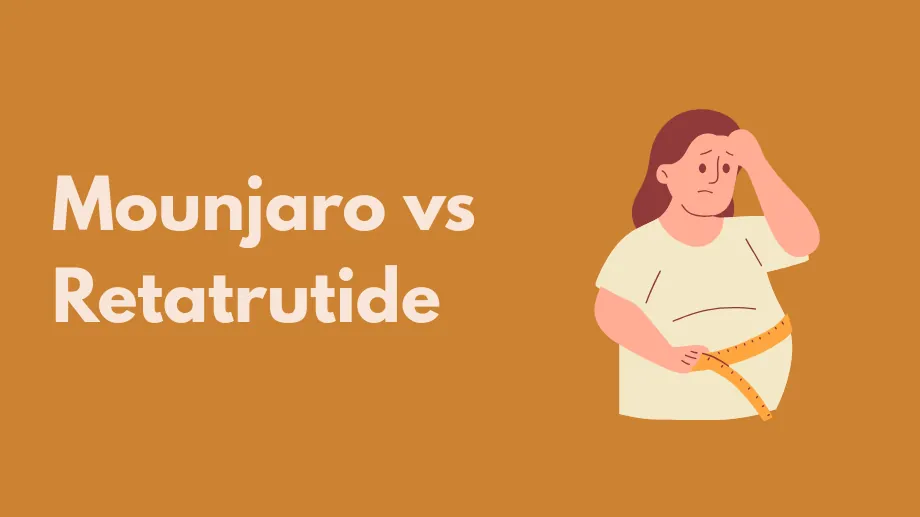Mounjaro vs retatrutide?

Due to drug shortages, many pharmacies across the U.S. were struggling to stock some of the newest weight-loss medications. Drug companies such as Novo Nordisk and Eli Lilly and Company have been working hard to get more drugs on the market to fill this gap. Two such drugs are Mounjaro and retatrutide. They have both shown the potential to be blockbuster weight loss drugs, even though neither is approved by the U.S. Food and Drug Administration (FDA) for this indication. Mounjaro is currently only approved to help regulate blood sugar levels in people with type 2 diabetes (T2DM), but clinical trials have shown significant weight loss as well. Its active ingredient, tirzepatide, is also approved for weight loss under the brand name Zepbound. Retatrutide has finished phase 2 trials, and phase 3 trials may be done before the end of this year.
So, which drug is better? Keep reading to see how these drugs work, and see which one may lead to more weight loss.
What is Retatrutide?
Retatrutide is a medication from Eli Lilly that is under development for the treatment of type 2 diabetes and obesity. It finished phase 2 trials in 2023, with phase 3 trial results expected to be released before the end of 2025. Eli Lilly is hoping retatrutide will be approved by the FDA within the next year.
Retatrutide is referred to as a triple G tri-agonist or triple hormone drug as it works at three different receptors. Like Mounjaro, retatrutide is a GIP (glucose-dependent insulinotropic polypeptide) and GLP-1 (glucagon-like peptide‑1) agonist. Where they differ is that it also works at the glucagon receptor. This is thought to help suppress your appetite so you eat less while increasing how many calories you burn.
What are some side effects of Retatrutide?
- Nausea
- Vomiting
- Diarrhea
- Stomach pain
- Headache
What is Mounjaro?
Mounjaro (tirzepatide) is a brand-name diabetes medication that is also manufactured by Eli Lilly. It is FDA-approved to treat adults with type 2 diabetes when used along with diet and exercise. It is not approved to treat people with type 1 diabetes or pancreatitis. Mounjaro should not be used with other GLP-1 receptor agonists, including Ozempic (semaglutide), Rybelsus (semaglutide), Wegovy (semaglutide), Victoza (liraglutide), Trulicity (dulaglutide), and Saxenda (liraglutide).
The active ingredient in Mounjaro, tirzepatide, works like two types of incretin hormones that your body naturally produces. It is classified as a GLP-1 and GIP receptor agonist. Stimulating these receptors helps lower your blood sugar levels, decrease how much food you eat, and reduce your body weight.
While Mounjaro is not approved for weight loss, Eli Lilly was granted a fast-track designation for tirzepatide to treat people with obesity in October 2022. Tirzepatide was eventually approved for chronic weight management under the brand name Zepbound.
What are some side effects of Mounjaro?
- Nausea
- Vomiting
- Diarrhea
- Decreased appetite
- Upset stomach
- Constipation
- Abdominal pain
Mounjaro can also sometimes cause serious side effects such as serious, life-threatening allergic reactions (hives, swelling of the tongue or throat, and shortness of breath), inflammation of your pancreas, gallstones, increased risk of certain types of thyroid cancer, vision problems, low blood sugar levels, and kidney injury.
Does Mounjaro or Retatrutide make you lose more weight?
Currently, there are no clinical studies that directly compare the average weight reduction of people taking Mounjaro and retatrutide.
However, the findings of the SURMOUNT-1 clinical trial from 2022 saw significant weight loss when compared to placebo. People taking Mounjaro 5 mg a week had an average weight loss of 15% of their starting body weight, while those taking 10 mg a week lost an average of 19.5%. The group taking 20 mg a week lost an average of 20.9%, with some losing as much as 22.5%. This was compared to people taking a placebo, who lost an average of 3.1% of their starting body weight.
Phase 2 trial results showed even better results for retatrutide. People with obesity but not diabetes lost up to 24% of their initial body weight in 48 weeks. Currently, retatrutide is in phase 3 trials that could be released by the end of 2025. They are hoping to seek regulatory approval within the next year.
In addition to the medication, the people who participated in both of these studies ate a healthy, low-calorie diet while regularly exercising.
Is Retatrutide or Mounjaro cheaper?
The cost of these medications will depend on several factors, including your insurance coverage. Many insurance companies do not cover Mounjaro for weight loss because it is only approved as a diabetes medication. However, it is sometimes used by healthcare providers for this indication. It is not known whether insurance will cover retatrutide when it comes on the market. You will need to talk to your insurance company to see if either of these medications will be covered. You can also check out the cost savings at Universal Drugstore for Mounjaro, as well as thousands of other prescription and OTC medications.
Sources
- Eli Lilly experimental obesity drug could beat rivals in total weight loss for patients. CNBC. Accessed July 1, 2025.
- Mounjaro – tirzepatide injection, solution. Eli Lilly & Company. Last updated 11/2024. Accessed July 1, 2025.

